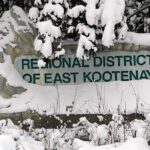Home »

Learn more about Basin water resources
New Trust report highlights status of water resources and future opportunities
A natural abundance of clean, fresh water defines the Columbia Basin and is an indispensable element of ecosystems and communities across the region. Since both climate and land use can influence water quality and quantity, understanding relevant changes and trends is increasingly important for Basin communities and resource managers.
 Responding to growing interest in current information about water resources in the Basin, Columbia Basin Trust (the Trust) commissioned a study about water quality and quantity in the region. The report outlines ways to increase our understanding of Basin water resources in a changing climate. It will be useful for natural resource managers, professional and citizen scientists, communities and residents to better understand and prepare for changes to come.
Responding to growing interest in current information about water resources in the Basin, Columbia Basin Trust (the Trust) commissioned a study about water quality and quantity in the region. The report outlines ways to increase our understanding of Basin water resources in a changing climate. It will be useful for natural resource managers, professional and citizen scientists, communities and residents to better understand and prepare for changes to come.
“One of our roles is to provide well-researched and current information that can support residents and communities to strengthen well-being in the Basin,” said Tim Hicks, Columbia Basin Trust Manager, Water and Environment. “That’s why we commissioned this report: to summarize current knowledge about water in the Basin and to identify knowledge gaps that could be filled to support ecosystem stewardship, community water supply planning and a range of other activities.”
The report provides a snapshot of current scientific knowledge about water resources within the Basin. It outlines:
The state of water monitoring efforts;
How climate change is projected to affect various types of water resources such as snowfall, glaciers, rivers and lakes;
Opportunities to strengthen understanding of water resources in the future.

“Acquiring long-term data about water is essential as it helps us better understand the effects of climate change on Basin water resources,” said Mel Reasoner, a Nelson-based climate scientist. “In turn, this informs planning processes that can help Basin communities address water-related challenges in the future.”
Water monitoring is particularly relevant to higher-volume water users such as communities, hydropower operators, agricultural producers, industrial operations and snowmaking at ski resorts, and can also benefit commercial and private recreational users.
“Having sufficient water at all times of the year is critical to keeping our hydro facilities running so that Basin residents can continue to have reliable power,” said Wendy Horan, Columbia Power Corporation Manager, Environment. “This report will be a valuable tool for assisting us in being better prepared for what the future holds.”
Addressing gaps in knowledge through improved water monitoring would help Basin communities and land managers to plan for and adapt to current and future water-related challenges.
 “Climate change is impacting our lakes, streams, rivers, wetlands, groundwater and glaciers. Water quality and quantity data are necessary for informed decision-making regarding water allocation, source water and ground water protection, environmental flow requirements for fish and healthy water-based ecosystems,” said Katarina Hartwig, Director at Living Lakes Canada. “Community based water stewardship is an opportunity for communities and citizens in the Columbia Basin to work collaboratively to collect the data necessary to help support informed water decisions and to build climate resilient communities.”
“Climate change is impacting our lakes, streams, rivers, wetlands, groundwater and glaciers. Water quality and quantity data are necessary for informed decision-making regarding water allocation, source water and ground water protection, environmental flow requirements for fish and healthy water-based ecosystems,” said Katarina Hartwig, Director at Living Lakes Canada. “Community based water stewardship is an opportunity for communities and citizens in the Columbia Basin to work collaboratively to collect the data necessary to help support informed water decisions and to build climate resilient communities.”
Numerous opportunities exist to strengthen understanding and stewardship of Basin water resources in a changing climate. The report suggests things like improving the monitoring and measurement of snow and glaciers, using existing data to understand snowfall in relation to climate change, increasing monitoring of smaller streams used for community water supplies and enhancing groundwater monitoring as a few examples.
The report was prepared by Martin Carver (Aqua Environmental Associates), with contributions from Greg Utzig (Kootenay Nature Investigations Ltd.) and Faron Anslow (Pacific Climate Impacts Consortium), among others.
To read Water Monitoring and Climate Change in the Upper Columbia Basin, visit:
The report is just one way the Trust supports efforts to safeguard and enhance the quality and availability of water in the Basin for a variety of human and ecological needs. It also supports initiatives like the Columbia Basin Water Quality Project, the Canadian Columbia Basin Glacier and Snow Research Network and the Columbia Basin Watershed Network, plus offers Environment Grants and a Climate Action Program. Learn more at ourtrust.org/environment.
 Columbia Basin Trust supports the ideas and efforts of the people in the Columbia Basin. To learn more about the Trust’s programs and initiatives, and how it helps deliver social, economic and environmental benefits to the Basin, visit ourtrust.org or call 1-800-505-8998.
Columbia Basin Trust supports the ideas and efforts of the people in the Columbia Basin. To learn more about the Trust’s programs and initiatives, and how it helps deliver social, economic and environmental benefits to the Basin, visit ourtrust.org or call 1-800-505-8998.
Above photo: New Trust report highlights status of water resources in a changing climate. The Columbia River Wetlands near Golden. Columbia Basin Trust images
Columbia Basin Trust







